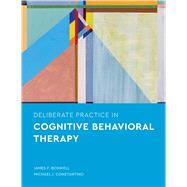Deliberate practice exercises help students and trainees rehearse fundamental cognitive-behavioral therapy (CBT) skills to develop basic competence and hone their own personal therapeutic style.
Each book in the Essentials of Deliberate Practice series contain customized exercises consisting of role-playing scenarios in which two trainees act as a client and a therapist, switching back and forth under the guidance of a supervisor. The trainee playing the therapist improvises appropriate and authentic responses to a series of client statements organized into three difficulty levels—beginner, intermediate, and advanced—that reflect common problems and concerns encountered by CBT practitioners.
The first 10 exercises each focus on a single skill, such as establishing goals for treatment; assigning and reviewing between-session exercises; working with various client cognitions, behaviors, and emotions; and addressing relationship ruptures and client resistance. These are followed by two comprehensive exercises—an annotated transcript and free-form mock therapy sessions—in which trainees integrate these essential skills into a single CBT session.
Step-by-step instructions guide participants through the exercises, identify criteria for mastering each skill, and explain how to monitor and adjust difficulty. Guidelines to help trainers and trainees get the most out of training are also provided.








